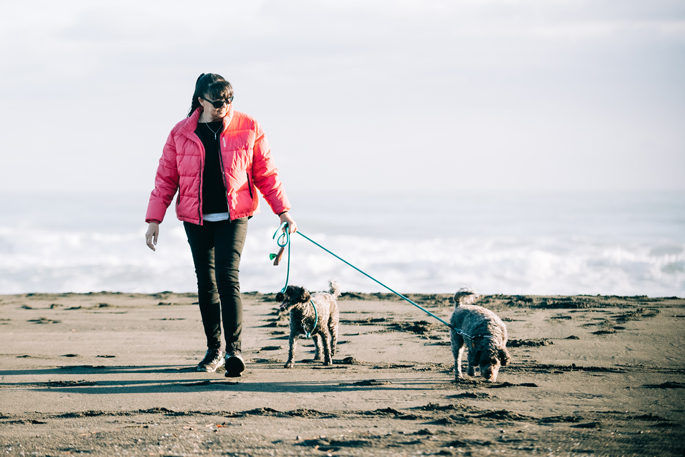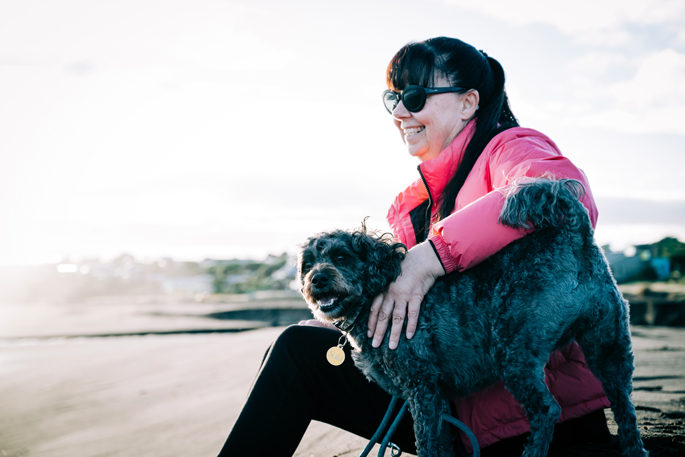Diane Alder says it was a huge shock to learn she had osteoporosis because she thought it was an older person’s condition.
The 58-year-old nurse had a nasty fall on New Year’s Day this year that resulted in a fractured wrist and forearm.
It has been a challenging recovery for Alder and early in her rehabilitation she received a call from the Fracture Liaison Service (FLS) to book her in for a bone density scan.
“It was a real bonus to receive that call and get booked in for a scan to see if there were any underlying issues,” she says.
“I didn’t know ACC funded that sort of support so it was great to get that information so I could make an informed decision.”
Alder leads an active life. She goes to the gym a few times a week and walks her dogs on the beach often. She had never broken a bone, so she thought her double fracture was just an unlucky accident.
“It was a huge shock to learn that I had osteoporosis. I think of it as an older-person condition, and I don’t consider myself an old person yet,” she says with a laugh.
Alder says the liaison service was a great experience. It gave her all the information on osteoporosis to help her in her recovery and also increased her understanding on how to manage her body.
On New Year’s Day, after taking her dogs for a walk, she slipped on water that had spilt from their bowls and went flying through the door.
She tried to right herself by grabbing the doorframe, but instead broke her wrist and fell headfirst out the door. Lying for a few minutes in pain, she slowly stood up and thought she’d just bruised herself.
“I was quite really shocked that both bones were broken. It was not the way I wanted to start the New Year.”
Alder went to Taranaki Base Hospital (Te Whatu Ora Taranaki) where she was put into a cast for six weeks. Her injury has had a big impact on her and those around her.
“It was just a real hassle to be honest,” she says. “I was in pain which was especially difficult when trying to get to sleep at night. Trying to get comfortable with an arm that is sore and aching was really annoying and frustrating.
“I was on holiday from work at the time, but I couldn’t do anything that I wanted to do.”
Alder says her experience shows it is better to prevent an injury happening in the first place because the older you get, the harder and slower it is to recover.
Her arm hasn’t healed perfectly, and she also has a torn tendon that will require surgery and another long recovery.
She returned to work as a nurse three weeks later on light duties and says it was great to get back into her role and connect with her workmates.
Adults aged 50 years and over who have sustained a fragility fracture can access the Fracture Liaison Service and many GPs can also refer them to the service also.
The Taranaki Fracture Liaison service, created in June 2022 through an ACC initiative, has been recognised as a star asset to the community, receiving the Silver Star rating accreditation through the International Osteoporosis Foundation’s (IOF) Capture the Fracture programme.
 Diane Alder.
Diane Alder.
Coordinator Jack Saju says the goals of the service are to “make the first fracture the last, identify osteoporosis, and to reduce falls and fractures within the region”.
It acts as a bridge between hospital (secondary care) and GP practices (primary care), to reduce barriers to managing osteoporosis. In Taranaki there are 785 people (aged above 50) identified as having a fragility fracture since June 2022.
Since opening, 530 people have received treatment recommendations following investigation by the service and over 57 percent have begun osteoporosis specific treatment within 16 weeks of identification.
The service creates care plans and provides treatment recommendations to suit individual needs.
“This recognition is extremely rewarding and provides a sense of meaningful contribution to our community,” says Saju. “It’s a great motivator for our team to help improve the quality of life for patients by providing comprehensive fracture care.”
Osteoporosis is a chronic condition which causes bones to become weak and brittle with reduced bone mineral density leading to increased risk of fragility factures from low impact trauma.
There has been progressive establishment and expansion of the service over the past decade, made possible through a partnership between Osteoporosis NZ and ACC. Today there is a service supporting each Health NZ district hospital.
In 2023, ACC accepted over 173,000 new claims for fall related injuries from adults aged over 65.
The total cost of fall related injuries for people aged over 65 in 2023 was $345 million to help people recover.
“We estimate that, by doing nothing to prevent these injuries, the cost of these falls and fractures would reach $720 million by 2035,” says ACC injury prevention leader James Whitaker.



0 comments
Leave a Comment
You must be logged in to make a comment.